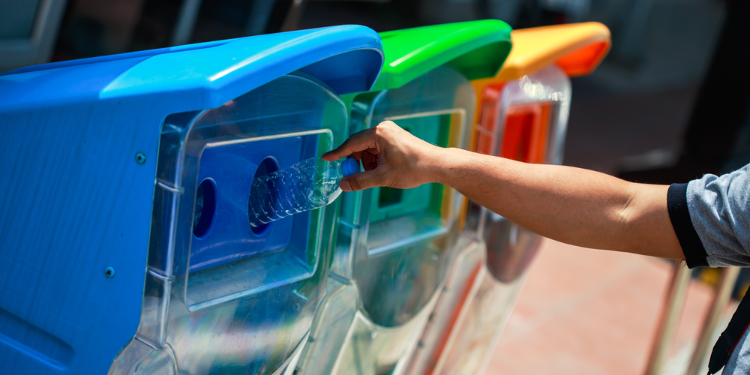
Exploring a new country as an expat comes with exciting discoveries and cultural nuances. And this is true for most aspects of our lives – even something as mundane as taking out the trash. From unusual restrictions to quirky regulations, here are some of the most peculiar garbage disposal laws around the world that expats should keep in mind.
The weirdest garbage disposal laws around the world
China's strict garbage sorting laws
China has recently introduced new recycling laws in its biggest city, Shanghai. Now, residents must split their garbage into four categories: recyclable items (containers like bottles and cans); hazardous waste, including batteries and pharmaceuticals; kitchen waste, comprising various food types, and miscellaneous waste, ranging from bathroom products to other non-specific items.
Shanghai is China's most trash-producing city. According to Xinhua News Agency, the city generates over nine million tons of garbage annually. With over 24 million residents (a scale three times that of cities like London or New York), Shanghai is a real recycling challenge, with just around 10% of its waste being subjected to recycling efforts.
The new law aims to improve the situation – quickly. And it puts a lot of pressure on Shanghai residents. Those who fail to comply with the new law not only face the possibility of substantial fines but also run the risk of having their crucial social credit scores reduced.
Japan's law on recycling household appliances
If you want to throw out a TV or a fridge in Japan, you need to pay attention. Japan has detailed laws regarding the disposal of household appliances. Citizens and foreign residents are required to pay a recycling fee when purchasing appliances, and manufacturers are responsible for recycling these items at the end of their life cycles.
The legislation known as the "Act for Recycling of Designated Household Appliances" came into effect in April 2001. This law specifically refers to four categories of household appliances: air conditioners, television sets, electric refrigerators and freezers, and electric washing machines and clothes dryers. Note that separate laws cover personal computers and small electronic devices.
Get paid to return bottles in Germany
In Germany, you can get paid for recycling bottles. When you buy a bottled drink in Germany, you are actually paying a deposit (known as "Pfand") for the container. Upon returning the empty container, you're reimbursed the deposit amount. Subsequently, the empty bottles are either recycled or repurposed. This has led to a cultural habit of returning bottles to designated recycling machines, which are often located in grocery stores.
Garbage doesn't touch the ground in Taiwan
Back in 1993, Taiwan was known as Garbage Island. Today, the country has some of the world's most efficient garbage management systems - and a fascinating tradition as a bonus.
Taiwan uses a "volume-based fee" system for trash disposal. Residents need to purchase official government garbage bags for their waste, and the cost varies depending on the size of the bag. This encourages waste reduction.
Another interesting thing about waste collection in Taiwan is the “don't let the garbage touch the ground policy”. This concept is an integral component of Taiwan's longstanding waste management strategy where residents are encouraged to hand over their trash bags directly to the garbage trucks instead of letting them sit in trash containers. In fact, this policy has turned the boring chore into somewhat of a heartwarming tradition.
Garbage trucks in Taiwan typically arrive at the same time and announce themselves by playing classical music like “Für Elise” or “Maiden's Prayer”. As neighbors leave their homes to take out their trash, they also socialize and catch up on local news.
Compulsory composting in South Korea
South Korea has basically eliminated food waste. The country recycles almost 100% of its leftovers.
In 2013, South Korea introduced a compulsory composting program: its residents are required by law to use special garbage bags for disposing of unconsumed food. These bags are labeled as "specified food waste bags," and cost 300 won (around 20 US cents).
Kenya's ban on plastic bags
In 2017, Kenya introduced a law that banned the use of disposable single-use plastic bags for both their use and manufacturing. This law was motivated by the detrimental effects of plastic pollution. Plastic bags clog drainage systems, emit harmful substances and often find their way into rivers and streams. Violators of the law can face a jail sentence of up to four years or a fine of 4 million Kenyan shillings – about USD 28,000.
Unfortunately, the law doesn't seem to be working as planned. While the manufacturing of plastic bags is still banned in Kenya, they are being smuggled from the neighboring country of Ethiopia and sold illegally. However, as an expat in Kenya, it is strongly advised that you follow the rules and stay away from plastic.
Don't chew gum in Singapore
Singapore made a rule in 1992 that says people can't sell or bring in chewing gum. This is because gum was causing problems by making places dirty and messy. There were also issues with people sticking gum where it shouldn't be, like on public transportation. So, the government decided to ban it to keep the city clean. They later allowed some special gum that doctors could prescribe in 2004, but regular gum is still not allowed.
What is the penalty for chewing gum in Singapore? A fine of up to $1,000 US Dollars for first-time offenders. If you chew gum again, you may be assigned a Corrective Work Order.
Conclusion
Let's be honest: most of us don't generally research garbage disposal laws from around the world. However, getting to know how a country handles its waste can reveal a lot about a destination you are considering. These laws reflect the diverse approaches countries take to tackle waste management and environmental concerns. From Singapore's strict ban on chewing gum to Germany's bottle deposit system and Taiwan's musical garbage trucks, each regulation offers a glimpse into the cultural, social, and environmental priorities of the respective countries. Plus, it can help you avoid hefty fines and general embarrassment as an expat.



















